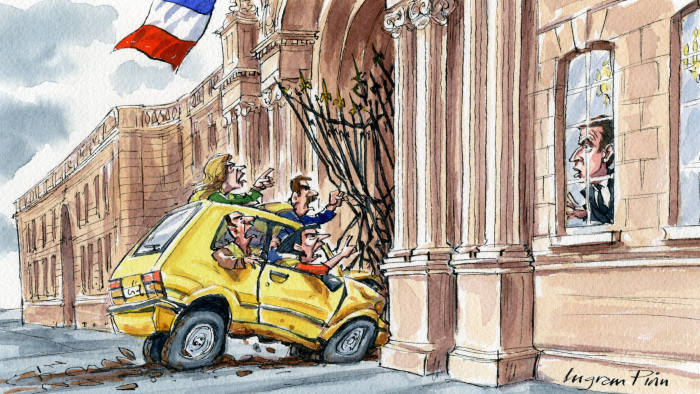Emmanuel Macron receives a lesson in populist politics
The French president will never be a man of the people but he is trying to make amends
Philip Stephens

There is nothing overly complicated about Emmanuel Macron’s struggle with the angry insurgency of France’s self-styled gilets jaunes. A president who stormed the citadels of the French political establishment en route to the Elysée Palace, and who has since pushed through an impressive array of reforms, turns out to be not so good at, well, politics.
Satisfaction with the way the yellow-vested protesters have punctured Mr Macron’s Jupiterian presidency is not confined to la France profonde. We have been watching the retreat from Moscow, a paid-up member of the Parisian elite said the other day of the president’s troubles.
Last summer Mr Macron marked his first year in office by celebrating a victory in Moscow for France’s football World Cup team. And now? A spate of ministerial departures and the weekly appearances on the streets of the gilets jaunes have seen his ratings fall.
At a time when governments across Europe are being destabilised by the growing distance between rulers and ruled, Mr Macron ignored one of the more elementary rules of politics. His government of super-smart technocrats barged its way into the relationship between voters and their vehicles. Cars do not matter much for metropolitan elites. But outside the big cities, they are a vital expression of individual freedom and an essential tool of daily life.
The French president is not the first to make such an error. In 2000 a young and hitherto hugely popular prime minister by the name of Tony Blair looked on helplessly as British fuel depots were blockaded by protests against rising prices at the pumps. The nation shuddered to a standstill. The lesson was learnt. During nine of the 10 years since the 2008 financial crash, British governments have frozen fuel taxes.
Colliding attitudes towards cars offer about as good a measure there is of the political estrangement within much of Europe between prosperous cities and struggling provincial towns and rural areas. In the 2016 Brexit referendum, most of Britain’s great metropolitan centres backed EU membership. The Leave vote came in provincial cities and towns. Remainers can take the bus or Undergound; for Leavers a car often is the only way to school or workplace. The well-heeled worry about air quality; their provincial cousins about the price of a tank of petrol.
The car, a Parisian friend reminded me the other day, has a particular significance in French politics. During the 1950s, the economic demands of the Poujadist movement, from which today’s gilets jaunes draw inspiration, came close to laying low the Fourth Republic. The establishment was saved only because fast-spreading vehicle ownership provided a safety valve for the grievances of small town France.
Mr Macron’s misfortune last autumn was that a long-planned increase in the fuel tax followed a succession of market-driven price rises and coincided with a government safety initiative cutting the speed limit on secondary roads. To add insult to injury, the government also toughened up safety checks on the older vehicles that fill the roads of rural France. An attack on living standards became an assault on the essential freedoms of many French citizens.
The measures could each be justified on its own terms. Put them together and they delineated the gulf between the worldview of a technocrat in the Elysée and the harsh realities of life for those beyond the Paris ring road. Appearances also matter. Mr Macron’s prime minister and cabinet would not be out of place on the Paris catwalks. Only the 71-year-old foreign minister, Jean-Yves Le Drian, has looks that blend with those in the sticks.
The president is making amends. He has frozen the fuel tax, raised benefits for those on the minimum wage and restored relations with the provincial mayors he had previously shunned. He will never cut it as a man of the people, but a much trumpeted national consultation invites citizens to have their say in shaping the future.
Listening and, more importantly, being seen to listen, is a good start. Marine Le Pen, leader of the renamed National Rally party, offers the protesters nothing but scapegoats and snake oil. The scapegoats are the elite, Muslim immigrants and the EU; the snake oil an economy crouching behind the walls of fortress France. There is nothing here but anger and bile. But like populists everywhere, Ms Le Pen has one big strength — a half-convincing pretence that someone is paying serious heed to the grievances of the left behind.
Mr Macron’s reform agenda has been unfairly traduced. True, some early tax breaks for the rich sent a confusing signal. But, fundamentally, his reforms — in education and training, welfare and taxation — are shaped to widen opportunity. The best answer to populism is a new economically inclusive social contract that answers the grievances of those pushed to one side by technological advance and globalisation.
This is the battle to be fought in the May European elections. But Mr Macron is all but alone among European leaders in promoting such a contract. He is not getting much help. This week he joined Germany’s chancellor Angela Merkel in signing a new Franco-German co-operation treaty. It has some useful elements, particularly in the area of mutual defence. But Berlin had to be dragged to the table. Ms Merkel is fluent in the language of European solidarity. The practice falls far short. Yet Germany, as much as any, needs Mr Macron to succeed.
0 comments:
Publicar un comentario